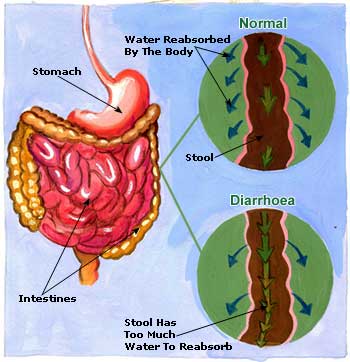
Diarrhoea, or loose and frequent evacuation of the bowels, is a serious condition. It can be broadly categorised into two types: ordinary diarrhoea and infantile diarrhoea.
Diarrhoea is passing looser or more frequent stools than is normal for you. It affects most people from time to time and is usually nothing to worry about.
What causes diarrhoea?
There are many different causes of diarrhoea, but a bowel infection (gastroenteritis) is a common cause in both adults and children.
Gastroenteritis can be caused by:
-
a virus, such as norovirus or rotavirus
-
bacteria, which is often found in contaminated food
-
a parasite
The symptoms associated with diarrhoea can vary depending on the cause. For example, if your diarrhoea is caused by an infection, you may also have a fever and severe stomach cramps.
In adults, bouts of diarrhoea can sometimes be the result of anxiety or drinking too much coffee or alcohol. Diarrhoea can also be a side effect of certain types of medication.
Treating diarrhoea
Most cases of diarrhoea clear up after a few days without treatment.
In adults, it usually improves after two to four days. In children, it often lasts slightly longer, between five and seven days.
Diarrhoea can lead to dehydration if it's severe, frequent or both, so you should drink plenty of fluids (small, frequent sips of water) while you have diarrhoea. It is very important that babies and small children do not become dehydrated.
Your pharmacist may suggest you take an oral rehydration solution (ORS) if you are particularly vulnerable to the effects of dehydration. If you are 60 years of age or over, frail, or you have a health condition such as cardiovascular disease, for example, you should take extra care.
Home Remedies:

In diarrhoea of ordinary intensity, preparations made of the various parts of the babul tree are useful. A mixture of equal parts of the tender leaves of the tree with white zeera and black zeera should be administered in doses of 12 gm each, thrice daily. An infusion made of the bark of the tree, comprising about a couple of ounces boiled in a pint of water, should be given thrice daily. Another useful remedy is to soak 3 gms of catechu, and 4 gm cinnamon for two hours in half a pint of boiling water, and to give the decoction in 10 ml doses, thrice a day.
Infantile Diarrhoea:
Infantile diarrhoea falls into a separate category. Contaminated milk or infection in the alimentary canal may cause diarrhoea in infants, and if an infant is breast feed, some of the digestive disorders of the mother may be transmitted to the child. Infantile diarrhoea may be accompanied by vomiting or gripping pain in the stomach. It is a common disorder at the time of teething.The child refuses milk, is giving to crying, and cannot sleep.Care should be taken in such a condition as continued diarrhoea may lead to dehydration. In some cases, infantile diarrhoea starts because the clild may be feeding the milk of a women who is pregnant.
Preventing diarrhoea
To prevent diarrhoea caused by infection, you should take steps to prevent the infection spreading. For example, make sure you:
-
wash your hands thoroughly after going to the toilet and before eating or preparing food
-
clean the toilet, including the handle and the seat, with disinfectant after each bout of diarrhoea
-
avoid sharing towels, flannels, cutlery or utensils with other household members
-
stay at home until at least 48 hours after the last episode of diarrhoea